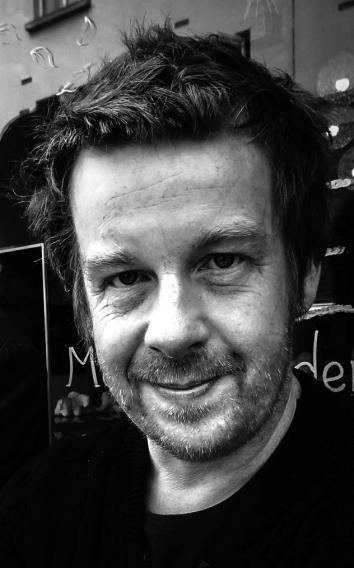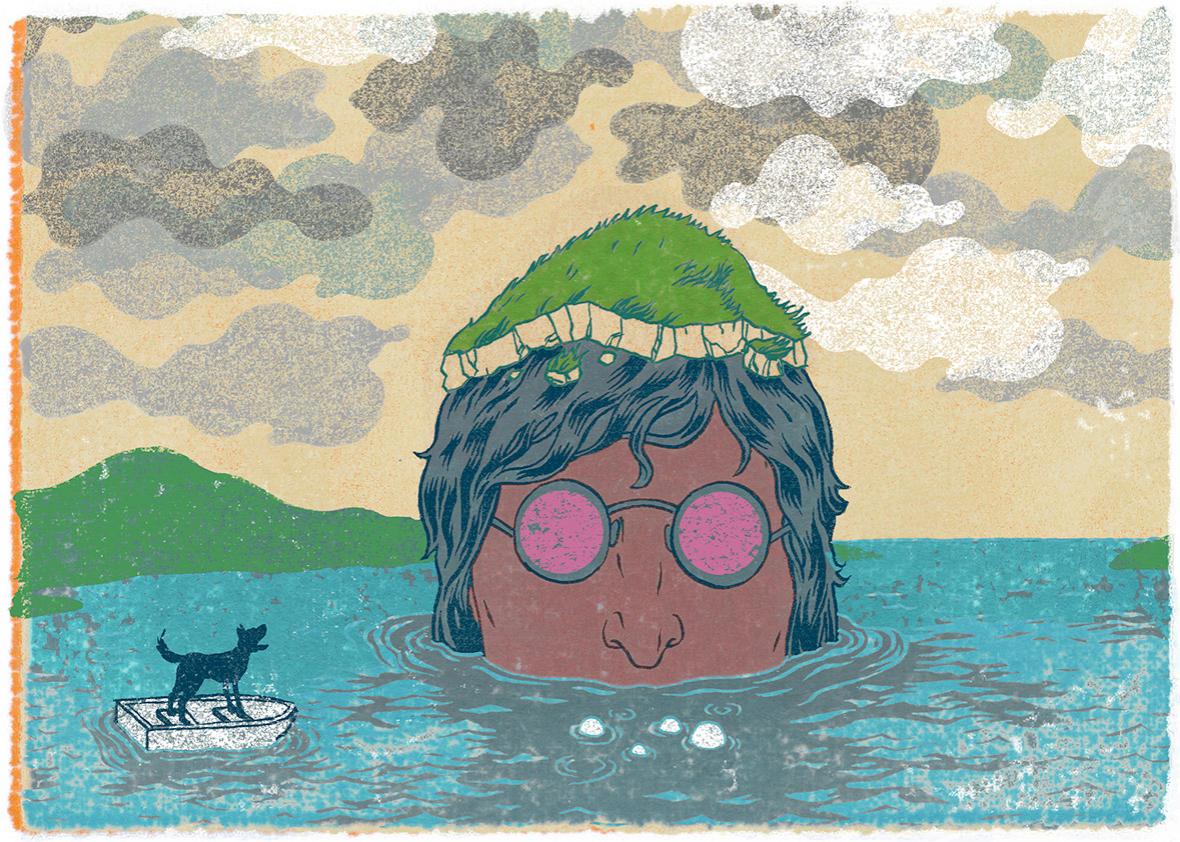This much is true: In 1967, John Lennon bought a tiny, rock-strewn island in Clew Bay, one of 180 clumps of turf and stone rimming the coast of northwest Ireland, with the idea of turning it into a hippie commune. He never followed through, though a few of his friends tried, until their shelters caught fire in the early ’70s. Yoko Ono sold it at a huge profit after Lennon died, donating the proceeds to a local orphanage.
The Irish writer Kevin Barry’s riotous second novel Beatlebone imagines that John goes back to the island in 1978, during his creative slump and existential crisis, to sit amid nothingness and scream (or, as the New Age gurus he frequented would say, Scream) for three days. En route, John languishes in a nearby hotel reading Burton’s Anatomy of Melancholy and sings duets with a street dog he names Brian Wilson (who moans “softly and tunefully in perfect counterpoint”). Finally he takes off on the road trip to his island—stopping off at various pubs, haunted houses, and caves along the way—accompanied by his driver-fixer-confidant, Cornelius O’Grady, one of the most appealing cryptic sidekicks in recent fiction, a blarney-drenched Sancho Panza to John’s soul-questing Quixote.
All this is frothy, playful stuff, and then, 199 pages in, Barry crashes his own book, recounting how, on a crisp morning of November 2011, he, Kevin Barry, found himself standing, “with all the other hunched pilgrims,” outside the Dakota, John and Yoko’s Central Park West apartment building, and suddenly “it felt like the moment to begin.” He flies back to Ireland, “operating at the usual deep thrum of anxiety and fretfulness,” sets out to find John’s island in Clew Bay, hangs out in a nearby cave, hallucinates a vision of black-clad ghosts frolicking in the ocean (who knows how much of this is true?), and has a bit of a go at a Scream himself—before, 32 pages later, resuming the ballad of John and Cornelius, circa 1978.
No author should be able to get away with so woolly an excursion into meta-land, not at such length or so flittingly. But Barry somehow does: John’s crackpot journey to the inner depths has already been tending toward the trippy (in an early chapter, when the dog Brian Wilson starts singing, Barry has John thinking, “This escapade is getting out of hand right off the fucking bat”), so why not plunge all the way in and let the author gulp down the blue pill too?
I went along with it, even while cocking an eyebrow, because Barry writes with such zest. The van that Cornelius drives isn’t just old and rundown; it’s “a bone-rattler, a money-shaker, all rust and lung disease.” A summer day isn’t just hot; it’s “a meat-spoiler.” John stares out a window into “the black oily panic of the night.” Seabirds “hover watchfully with their mad eyes, all wing span and homicide.” When the sea moves, there’s “a foul hypnosis to it,” and John “can hear the white noise of a migraine feedback.” The whole of western Ireland creaks “dank and sodden” with its “banshee wind” and “savage melancholy.”
There’s music to Barry’s prose: Smart rhythms dart through his sentences; taut bridges join his paragraphs; the tinge of hysteria serves to animate his characters and their surroundings. His dialogue is whimsical, sometimes hilarious, catching the idiom of the local life, and, in Beatlebone, nailing John Lennon, the wittiest and darkest Beatle, spot on.
In a scene set in Cornelius’ house, where the two are watching The Muppet Show while hiding out from reporters, John mentions he’s been asked to go on the show three times.
Cornelius thinks about it for a bit and shrugs.
I suppose they had Elton John on the other week.
No surprises there.
He was superb, John.
Did you really think so?
I did.
No accounting.
Are you going on, John?
I’m not.
Why not?
It’d be too fucking whimsical… And not being a dry arse but it’d be too light. You’ve got to play along with all the routines. You’ve got to do the hokey-cokey with Miss fucking Piggy. You’ve got to do all the wisecracks with the frog. And to be honest, Cornelius, I don’t know if I’m in the mood these days.
I think you should go on, John.
Really?
What harm in it?
Well.
It might take you out of yourself, John.
I suppose it might.
(None of the Beatles, in fact, ever went on The Muppet Show, though Paul and Ringo wanted to. Elton John did appear, around the time Beatlebone takes place, and Cornelius has it right.)
Born in Limerick, raised all over, and living at the moment in a converted police station in County Sligo, Kevin Barry is 46 and writes as if he’s been through a wringer while laughing. His two collections of short stories, There Are Little Kingdoms and Dark Lies the Island, are funny-grim portraits of people grappling with stubborn obstacles to their forlorn dreams. His comic flair and mordant themes invoke the dark mischief of George Saunders, Kingsley Amis, and Martin McDonagh. But Barry carries on the business in an original, vital voice, one imbued with the quirks of the remote counties of the remote island of Ireland, whose people and landscapes can be—from one moment to the next—loquacious and stiff-armed, stirring and desolate. His characters tend to be pathetic, occasionally verging on monstrous—a failed poet from Dublin who buys a bar in the sticks and tries desperately to fit in, chums who escape their empty lives by rating their lagers on a scale from 1 to 10, a pair of dotty ladies who cruise tourist spots in search of small children to kidnap—but they’re never less than engaging, and some bear shreds of redemption.

Photo by Conor O’Mahony
His stories aren’t morality tales or life lessons; they’re too twisted for that. And yet, however nasty the proceedings (and they can get very nasty), a ray of humanity shines through “the lonely airs” and “the rattling of the bones”—a feat that he pulls off without the crutch of sentimentality. Barry would likely scorn the term as too long-faced, but there’s a maturity to most of his stories’ rantings and resolutions. At the end of Beatlebone, John returns to his New York recording studio, still tethered to the rues and reveries of his childhood but now content with his lot and even pleased with the choice turns of phrase in his latest rant-driven song.
In “Fjord of Killary,” the best of Barry’s short stories from Dark Lies the Island (and one of the few originally published in an American magazine, in this case the New Yorker), the narrator—the failed poet who takes over the unwelcoming bar—experiences an epiphany when a downpour floods his establishment, the waters rising biblically higher, as he merrily pours drinks for his surly staff and sharp-elbowed customers, all of them now dancing or dry-humping in abandon:
The world opened out to its grim beyonds and I realized that, at forty, one must learn the rigours of acceptance. Capitalize it. Acceptance. I needed to accept what was put before me—be it a watery grave in Ireland’s only natural fjord, or a return to the city and its greyer intensities, or a wordless exile in some steaming Cambodian swamp hole, or poems or no poems, or children or not, or lovers or not, illness or otherwise, success or its absence… Electrified, I searched for a notebook… I felt a new, quiet ecstasy take hold.
The gloom of youth had at last lifted.
Many of Barry’s stories dwell on the gloom of youth and its lifting or failure to lift. His first novel City of Bohane wandered down that path too, in a Gothic-noir tale of gangs, rivals, betrayal, and lost love, set in a dystopian future, spiked with an invented street-urchin lingo—The Godfather meets A Clockwork Orange, as channeled through Flann O’Brien. It was a bold experiment, drawn with vivid zest, but prone to ramble and lose focus.
Beatlebone isn’t perfect, either. A chapter about a faux-guru holding private Scream sessions in the Amethyst Hotel (a real, though long-abandoned place not far from Clew Bay, where such a guru did hold such sessions) goes on for too long, while John’s perusal of Burton gets too short a shrift. Happily, Brian Wilson the dog makes a welcome reappearance near the end.
But it may be that, at this point in his evolution, Barry couldn’t churn such precise yet adventurous prose from his “deep thrum of anxiety and fretfulness” without taking some wild leaps. “I guess, essentially,” Barry writes in an email about Beatlebone, “the book is a portrait of an artist and about how you have to go to extremes, and to your own dark places, to create anything worthwhile.” A fair description, though the portrait is of two artists, an imagined John Lennon and the imagining Kevin Barry, and, given the vast stretch of Barry’s leaps in drawing them, it’s a neat trick that this shaggy-dog story works as a novel at all—and a triumph that it does so with such depths of human feeling.
—
Beatlebone by Kevin Barry. Doubleday.
See all the pieces in the Slate Book Review.
Sign up for the Slate Book Review monthly newsletter.
